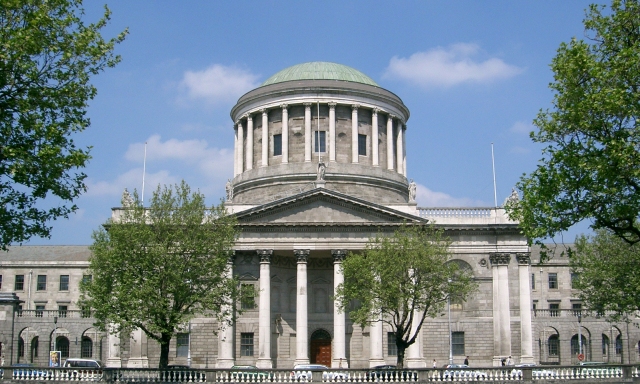Peat giant halts harvesting following High Court ruling

July 26th, 2019
One of the island’s largest peat operators has ceased harvesting following a High Court ruling to temporarily suspend new regulations to remove large-scale extraction from the planning regime.
Westland Peat Limited, a multi-million euro gardening company, today confirmed that it has not harvested any peat since Tuesday’s High Court decision by Mr Justice Garrett Simons.
The Tyrone-based company that started out selling compost is engaged in commercial peat extraction at several locations in Co Westmeath that total up to around 270 hectares.
At present, projects of 30 hectares (ha) or more are subject to enforcement oversight under the planning regime, with additional regulation from the Environmental Protection Agency (EPA) where the area of activity goes above 50ha.
In January, however, the Minister for Planning Eoghan Murphy TD published new regulations to exempt large-scale projects over 30ha, such as Westland’s, from any requirement to obtain planning permission.
Further secondary legislation brought by the Minister for the Environment Richard Bruton TD would lower the threshold for EPA licensing to 30ha.
However, this change will not occur for at least 18 months for unlicensed activities and 36 months for licensed activities. To date, Westland does not have either planning permission or an EPA license.

Regulations on hold
This gap, according to Friends of the Irish Environment (FIE), would create an “enforcement holiday” and a suspension of the obligation of peat extraction projects to comply with European law, namely the Environmental Impact Assessment (EIA) and Habitats Directives.
Article 2(1) of the EIA Directive states that EU Member States must ensure that projects likely to have a significant impact on the environment are made subject to a requirement for development consent through the likes of planning permission.
Projects may also need to be assessed under the Habitats Directives depending on proximity to, and potential impact on, protected nature areas.
FIE has brought Judicial Review (JR) proceedings against Mr Murphy’s decision and also sought a temporary injunction to stop the regulations from coming into force until the JR case is heard. Mr Justice Simons ruled on Tuesday to grant the injunction until the JR case proceeds in September.
“The practical effect of [the regulations] is that certain peat extraction activities …. may continue for a period of in excess of 18 months without there being any obligations under domestic law to hold development consent,” Mr Justice Simons said in his judgement.
“Unlicensed peat extraction may thus be carried out without there being any risk of enforcement action,” he said. A breach of EU environmental law, Mr Justice Simons added, would represent “an especially serious breach” of the State’s obligations as an EU member.
Following the ruling, FIE’s solicitors O’Connell and Clarke sent letters to large peat operators that have neither planning permission nor an EPA licence – including Westland – reminding them that they cannot now rely on the new regulations “as a defence to enforcement proceedings”.
“Failing to receive an undertaking by return that all extraction works will cease, together with proposals in relation to the restoration and reinstatement of the bog land in question, we are instructed
[by our client] to bring proceedings,” the letter reads.
In a reply sent today seen by The Green News, Westland’s legal representative Arthur Cox states that its client has been “lawfully harvesting on their site in accordance with the Regulations” until the decision on Tuesday.
Following the ruling, the letter reads, Westland “accepts that they must cease harvesting peat” and has “not harvested any peat since the decision of the Court on Tuesday”.
“Any loose peat (already harvested) on the fields presents an immediate environmental risk and is being taken off the fields and stored safely on site,” the letter continues.
Site management activities such as ditching of drains, maintenance of drainage manholes, and cleaning of silt ponds will continue in order to ensure “proper bog management” and to avoid any risks to the environment from a lack of maintenance of the site.
Westland and several other large peat operations without planning permission or an EPA licence were contacted for comment, but did not reply at the time of publication.

Commission puts foot down
FIE has also written to Local Authorities in counties where the companies are based, pointing out that councils must take enforcement action where they are aware of unauthorised activities.
The director of FIE, Tony Lowes, said that failure to act will reflect badly on the Irish State that is again subject to scrutiny from the European Commission over how it regulates the peat industry.
Yesterday, the EU body confirmed that it is taking action against Ireland for failure to ensure that peat extraction is properly assessed for environmental impacts as required under EU law.
The issue dates back to the late 1980s when the Commission first took action against the State for a failure to correctly transpose the EIA Directive into Irish law.
The Commission argued that Ireland incorrectly set the area size for which peat extraction projects would need to be assessed too high at 50ha.
This ensured that it was not possible to guarantee that every project likely to have significant effects on the environment would be subject to an assessment, the Commission said.
Mr Lowes warned that any further failure by local authorities to take proceedings will “undoubtedly” impact on the Commission’s proposed infringement proceedings. This, he said, may result in “significant fines to be paid by the Irish taxpayer”.

Case set for next week
FIE is set to appear before the High Court again next Tuesday in separate proceedings over planning permission requirements for another large peat operation.
In 2013, An Bord Pleanála found that peat extraction, as well as bogland drainage, peat handling, and other associated activities, were development and required planning permission.
The decision followed a referral from FIE as to the planning status of three separate large peat operations run by Westland, Bulrush Horticulture and an unnamed third company. FIE argued that the works were not exempted development and should be subject to an environmental assessment.
The Board found that the operations of Westland and Bulrush were not exempt development. Legal challenges from both companies were brought in 2013 seeking to have the Board’s decision quashed. The challenges, heard last year, failed and subsequent appeals were lost in December.
The Board dismissed FIE’s request for the third operation, based in Co Westmeath, as the identities of the owners of the different parcels of land under extraction could not be fully identified.
The Board’s dismissal was challenged by FIE in the High Court in May 2013. The case was not determined until last March when Mr Justice Charles Meenan held the Board’s decision.
An appeal application from the environmental NGO was refused; however, a “leapfrog” appeal to the Supreme Court was accepted due to the general public importance in the case.
In seeking to have the Supreme Court hearing dismissed, the Board argued that the issues raised by FIE in relation to Article 2(1) of the EIA Directive went beyond the scope of the grounds of its appeal and that several issues now being raised were not argued in the High Court proceedings.
FIE, in turn, argued that it was perfectly acceptable to raise an argument based on EU law that is relevant to the proper interpretation of the Planning and Development Act 2000. FIE also argued said that Article 2(1) of the EIA Directive was referred to in its statement of grounds for the initial High Court proceedings.
In her judgement released this morning, Ms Justice Mary Irvine said that, while she was satisfied that “there is much merit” in the Board’s argument, she is also “mindful of the supremacy of EU law” and the risk of interfering with the Court’s obligations to ensure that national law is “properly construed against the backdrop of EU law”.
She also found, however, that FIE is only entitled to rely on Article 2(1) to a “limited extent” in the course of the appeal and is “not being afforded the liberty of making any stand-alone argument or point based upon European Law”.
She proposed that both parties “be afforded an opportunity to amend their submissions”. The ruling was succinctly summed up by the Chief Justice, Mr Justice Frank Clarke: “I think it is reasonable to describe the judgement as a draw.”
The case is remitted back to the High Court with a hearing date set for next Tuesday.
[x_author title=”About the Author”]







